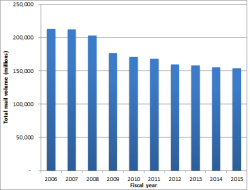December 9, 2015
About two-and-a-half months after it was introduced, Delaware Democratic Senator Tom Carper’s latest bid to reform postal law gained its first three co-sponsors in the Senate: Senators Jerry Moran (R-KS), Claire McCaskill (D-MO), and Roy Blunt (R-MO). While it does represent progress, it is far less momentum than such a bill would need to move in Congress. Carper’s bill continues to be a victim of U.S. Postal Service (USPS) success and continuing disagreement among those most affected by it.
The USPS recently reported its second annual operating net income over $1 billion in a row. The cash crisis that spurred Carper and others to action has passed—USPS cash is around $7 billion, roughly a month’s worth of liquidity. And mail volume has settled north of 150 billion pieces after peaking at just over 200 billion.
Controversy about the bill persists, which makes it very difficult to pass in today’s Congress. Customers have fought the exigent surcharge for over three years and finally won a ruling by the Postal Regulatory Commission (PRC) that it will end around April 2016. Most of them see no reason to convert a temporary relief measure into a permanent cash infusion, equal to an estimated $60 billion net present value, as the Carper bill seeks. The USPS had collected $3.5 billion incremental revenue as of September 30, 2015, and will bank $4.6 billion by the time the surcharge ends in spring 2016. This appears to many customers a very generous bridge grant to enable adjustment to the “new normal” following the recession.
Customers also are concerned that the bill’s proposed moratorium on consolidation of post offices for five years and processing plants for two years would artificially prevent USPS from adjusting to the “new normal” of 150 billion pieces of mail. Proponents of freezing consolidation point to the early 2015 service level disruptions as unavoidable consequences of right-sizing. Not surprisingly, some Senators representing largely rural states have been inclined to support a consolidation freeze.
Finally, political experts have asserted that shifting the cost of postal retirees’ health insurance from the USPS to Medicare, while providing a large financial relief, is a very difficult sell in the Republican House and Senate.


Leave a Reply